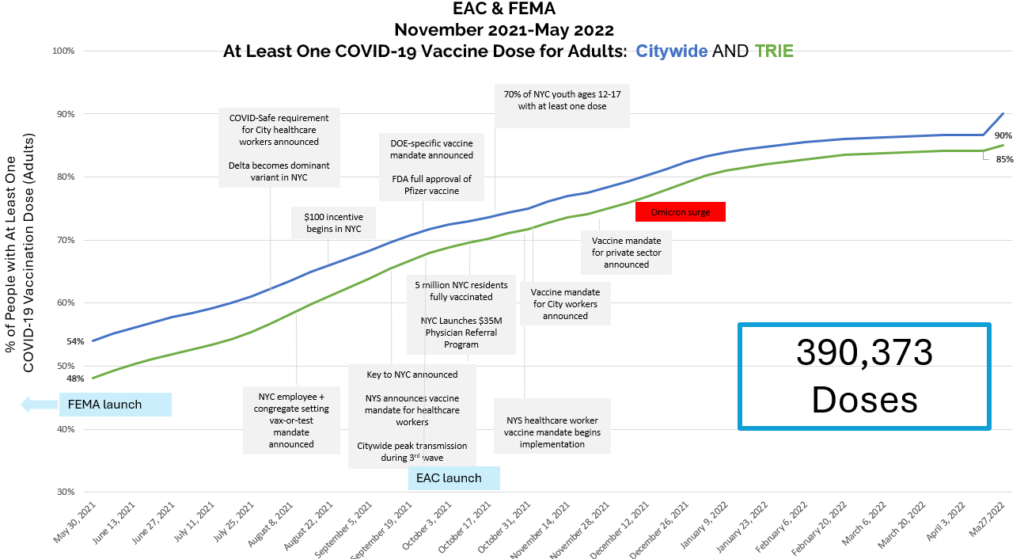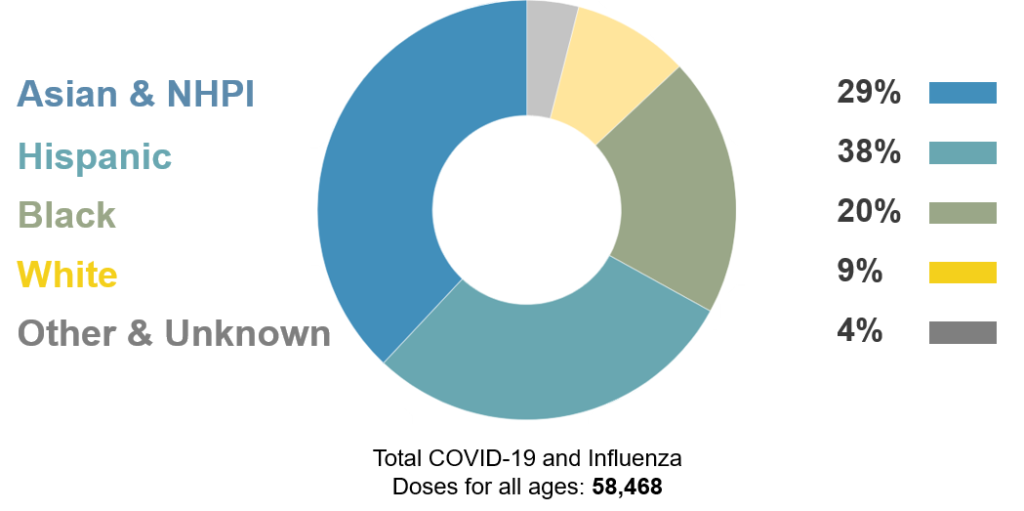CUNY KCC – Graduation Celebration for Birth and Postpartum Doulas
September 3, 2025World Diabetes Day 2025: Confronting Inequities in NYC
December 16, 2025NYC REACH Vaccine Initiatives

Since 2021, NYC REACH has partnered with Federally Qualified Health Centers (FQHCs) and other clinics to expand equitable vaccine access in Taskforce on Racial Inclusion & Equity (TRIE) neighborhoods—communities disproportionately affected by COVID-19 and marked by significant health and socioeconomic disparities.
For more information on this project, email Director of Strategic Project, Carlos Devia, PhD at cdevia@health.nyc.gov.
Program History:
NYC REACH’s vaccine initiatives over the past five years centered on reducing health inequities, supporting the public health workforce, and strengthening primary care in communities most impacted by the pandemic.
- April 2021: We launched the Vaccine Expansion Initiative, funded by FEMA, to increase vaccination rates in low-coverage areas and increasing capacity at FQHCs.
- In response to racial and geographic COVID-19 disparities, the City identified 33 priority neighborhoods accounting for over half of cases and lower-than-average vaccination rates, known as the Taskforce on Racial Inclusion & Equity (TRIE) initiative.
- November 2021: To address equity gaps, the Expanded Access to Care (EAC) program launched with a neighborhood-based approach, delivering vaccines and strengthening primary care services in TRIE communities.
- May 2022: As of May 2022, only 47% of children aged 5–11 in New York City had completed the primary COVID-19 vaccine series. In response, the NYC Pediatric COVID-19 Vaccination Support Program was launched to collaborate directly with independent pediatric providers and support efforts to increase vaccination coverage among this age group.
- July 2022: With the conclusion of the EAC and the end of the COVID-19 vaccine mandate, the Continue Access to Vaccinations (CAV) program launched to sustain vaccination infrastructure in TRIE neighborhoods, integrate COVID-19 into routine primary care, and minimize missed opportunities for flu and other routine immunizations.
- October 2023: Following the end of the Public Health Emergency and the commercialization of COVID-19 vaccines, new barriers to vaccine access emerged for uninsured and underinsured New Yorkers. In response, the CAV-U initiative was launched to ensure continued free vaccine access citywide.
NYC REACH IMPACT:
Emergency Period (2021 – 2022)
To address inequities in vaccine access, FEMA, EAC and CAV implemented efforts to increase equitable distribution of COVID-19 and influenza vaccines within these TRIE neighborhoods, where vaccination rates lagged behind the citywide average.
When the EAC project launched in October 2021, only 68% of adults in TRIE neighborhoods had received at least one vaccine dose, compared to 74% citywide. By May, that increased to 85%, narrowing the vaccination gap from 14 to 5 percentage points. EAC and FEMA contributed over 390,000 vaccines, showing the power of a targeted, equity-driven public health response.
During the early rollout of pediatric COVID-19 vaccines, only 47% of NYC children ages 5–11 had completed the primary series. In response, the NYC Pediatric COVID-19 Vaccination Support Program launched to incentivize independent pediatric practices to vaccinate children ages 6 months to 11 years. The program successfully boosted vaccination rates, particularly among children ages 6 months to 5 years—a group with notably low initial uptake.
Pandemic Recovery (2022 – 2023)
During the post-pandemic recovery, the Continued Access to Vaccination initiative supported 26 vaccination sites across the city. Over 80% of the vaccines administered by CAV sites went to people of color. At least 65% of COVID-19 vaccine recipients were residents of TRIE neighborhoods, underscoring the program’s strong alignment with equity goals.
Commercialization of COVID-19 Vaccines (2023-2025):
Through the transition of commercialization of COVID-19 vaccines, the Continued Access to Vaccination for Uninsured Adults Program (CAV-U) focused exclusively on under- and uninsured individuals, continuing to prioritize equity in access. Nearly, 20,000 vaccines have been delivered to under- and uninsured individuals. The majority of COVID-19 vaccines were administered to TRIE neighborhood residents, particularly in the Bronx and Upper Manhattan.
Overall, the CAV-U outcomes represent a critical public health contribution, as vaccination coverage among uninsured populations is projected to decline over time due to federal cuts, potentially deepening existing healthcare disparities for this population.
In the past five years, over half a million vaccines have been delivered to communities disproportionately impacted by the pandemic—those facing the greatest burden of cases, hospitalizations, and mortality. This monumental achievement represents a profound contribution to the health and resilience of New York City.
Beyond Vaccines:
Beyond vaccinations, our goal at NYC REACH and BEHS is to transform the healthcare delivery model and reinforce the public health workforce in primary care. A cornerstone of our vaccine programs was the integration of community health workers into care teams—ensuring each patient received not only clinical care but also support to address broader health and social needs. During the 5 years of partnership, CHWs reached 558,461 patients with phone or in-person outreach and counseled 278,400 patients on missing routine vaccines, in addition to supporting and addressing social needs and screenings.
Over 117,000 screenings assessed behavioral health, chronic conditions, access to care, and social determinants. The most common social needs were food insecurity, housing instability, and employment support. About 27,000 people were linked to primary care for type 2 diabetes, behavioral, and cardiovascular health.









